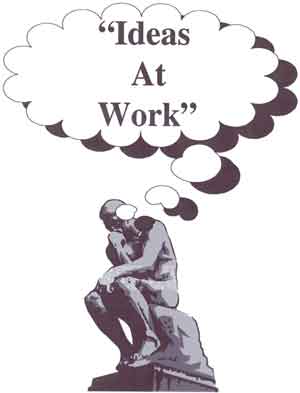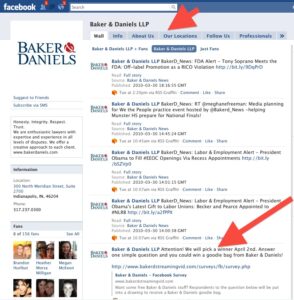EDITORS NOTE: This post is from 2010. Check out this 2017 post on chat bots. The future is now.
The Semantic Web (Web 3.0) is both fantastic and, like most new technology, a bit scary: Do I really like the idea of every little move I make becoming data to be tagged and processed electronically? What if it ends up in the wrong hands? And what to think of the “Big Brother” effect? Spooky right? On the flip side, how cool will it be when your calendar displays the photos you took on a particular day and time.
I’ve been reading a fascinating book on my Kindle, Pull: The Power of the Semantic Web to Transform Your Business by David Siegel. The author reveals, among other hard to imagine transformations that within 10 years my refrigerator will provide my grocery-shopping list—it will inventory everything I put in it. It will know when I take it out and not return it, or even return it half-full.
It will know my recipes, too. When I’m shopping in a store, the semantic web will make information available in a format that the cart can understand. The cart will tally up my bill as I place items into the cart, also sending that information to the supply chain. (Some supply chain information exchange is already happening semantically.)
It will know my driving habits, health issues, entertainment choices, and more. AND, not only will it have the information but it will help me do what I need to do with it. It’s not one way (web 1.0) or two-way (2.0) but 360 degrees of interactivity! For the most part, on the semantic web our lives will be a living digital habitat. We’re seeing the tip of it as our conversations on the social web today are creating a web of data that returns personalized recommendations based on what our “friends” are buying or reading, or it can prioritize the mail in our in boxes according to our patterns.
What will life be like, both personally, and professionally?
I wonder how will it play out in the practice of law—beyond eDiscovery. How will it improve the client experience or the flow and use of data in tracking cases, legislation, calendaring? We are only limited by our imagination as the technology is already way ahead of us.
The conveniences of artificial intelligence vs human interaction. Will we have a choice? This semantic world is moving very fast in business, science, and medicine. Read the book and be amazed.
 Digital Storage
Digital Storage
My recent move to a new home and office revealed how natural the progression may be. Here’s why.
Moving your home and/or office is pretty stressful. Not just emotionally or financially, but physically. Unless you’re one of the lucky ones and can afford to hire someone to pack for you, you will TOUCH EVERYTHING IN YOUR POSSESSION. And sometimes you will have to LIFT HEAVY BOXES in order to move about as you are packing. While possessions are nice and they make a home, well, homey, when its time to move they are trouble. For me, during my recent move, I toyed with the option to give them all away and start over at my new home.
This feeling started as I began going through my office storage closet. I had a least a dozen file boxes of articles, source material, and old hard copy conference handouts, forms, folders, and you name it that I was saving to reference some day. I’d been lugging them around the past eight years—call me a nomad, this was my fourth move.
Sorting through the “stuff,” I realized how much great information I had stored away—and rarely accessed.
Needing to cut the baggage I reasoned:
Everything is digital these days in the form of blog posts, videos and podcasts. Everything I could possibly need in those hard copy archives could probably be found somewhere on the Web. Although I know there were classics and golden nuggets in those boxes, what goes around comes around again. So pitch them. Besides, in the past five years I’ve actually quit keeping hard copies of anything. I store and file snippets, ideas, receipts, forms, contracts, and more, digitally, on my Mac or in the cloud on deli.ci.ous, Evernote, or Google Docs: Lightweight, easy to access, and search from any computer.
When I got to box with the floppy discs, I wondered, where would I ever find a machine that could read them any more? And all those music CD’s? They’re heavy and I never use them now that I’ve transferred all the music to my iTunes—carefully backing up every thing to an external hard drive every 30 minutes all day long. (I remember when I packed up my LPs and stuffed them in the attic at my mom’s house thinking they’d be back some day…nah, except for collectors, keeping this “stuff” is just impractical if you want to fly light.)
I decided to keep hard copies of personal stuff like my Will, my family medical history and birth certificate, but in the back of my mind I thought…if they ever got lost how hard would it be to get a digital copy? Do I really need all this paper?
And photos. Over the years I’ve put more photos on my computer than in my photo albums. Plus when they are stored digitally, I don’t worry about them being damaged in a hurricane or God forbid a fire. So, I kept only those prints that seemed priceless (family history and all.) Besides, I love the feel of real photos. And Books. I love paging through a printed book and I hope they never go away. But, after schlepping over a half dozen HEAVY boxes of books this last time, I got to thinking when it’s time to move again I’d be glad to pack just one box—my computer.
All this to say, storing stuff in a digital environment is practical, the least of which is for moving and perhaps the greatest of which will be how the data will flow in the semantic web era.
I’ll be keeping an open mind on the semantic web for both personal and professional uses. I Meanwhile, if there are any futurists out there: Penny for your thoughts?






Wow, that is a string of bad luck. Sorry to hear of that. Thanks for sharing. I hear you about the cloud. I don’t store my most valuable stuff there, but I do have an external hard drive that backs up my complete system, including emails, every 30 minutes. While I haven’t had to use it due to a crash or corruption, I do use it to work between my desktop and lap top. It’s small and I can carry it anywhere. I guard it like my life. I’d rather lose my phone (which has tons of data on it) than my hard drive! Worse though… I was without Internet service for four days last week – thank you Comcast – and was extremely frustrated by their inability to resolve the situation promptly because ALL my work revolves around the web in one way or another. That being said, a few years ago I purchased an air card and though I pay Sprint a hefty bit of change every month for service which I don’t often use, it’s been well worth it. When the electric grid goes down, as long as my puter battery is charged, I’ve been able to access the web.